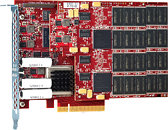- Joined
- Oct 9, 2007
- Messages
- 47,527 (7.48/day)
- Location
- Hyderabad, India
| System Name | RBMK-1000 |
|---|---|
| Processor | AMD Ryzen 7 5700G |
| Motherboard | ASUS ROG Strix B450-E Gaming |
| Cooling | DeepCool Gammax L240 V2 |
| Memory | 2x 8GB G.Skill Sniper X |
| Video Card(s) | Palit GeForce RTX 2080 SUPER GameRock |
| Storage | Western Digital Black NVMe 512GB |
| Display(s) | BenQ 1440p 60 Hz 27-inch |
| Case | Corsair Carbide 100R |
| Audio Device(s) | ASUS SupremeFX S1220A |
| Power Supply | Cooler Master MWE Gold 650W |
| Mouse | ASUS ROG Strix Impact |
| Keyboard | Gamdias Hermes E2 |
| Software | Windows 11 Pro |
Texas Memory Systems, Inc. (TMS), provider of The World's Fastest Storage, today announced that TMS RamSan PCIe storage systems, including RamSan-70 products, are now bootable storage devices. This functionality is provided through a new firmware feature that allows most common servers to load operating systems directly from RamSan PCIe Flash storage systems, without requiring the presence of legacy hard drives or RAID controllers.
Launched in 2011, TMS RamSan-70 products have already been adopted by a broad variety of customers in healthcare, banking, e-commerce, and many other industries. Industry-leading bootability further minimizes complexity in such business-critical systems. Newly bootable RamSan-70 products are available with up to 900 GB of SLC Flash storage capacity and capable of 1.5 million I/Os per second (IOPS), 2.5 GB/s of bandwidth, and 30-60 microsecond latency. Bootability is available with the purchase of all new RamSan-70 PCIe storage systems, or as a firmware update with no hardware replacement necessary for existing RamSan-70 PCIe storage customers.

"Customers have been enjoying industry-leading performance from our PCIe Flash storage systems for over three years, and now with this firmware upgrade, we can allow large-scale customers to simplify and consolidate everything around Flash," said Dan Scheel, TMS President. "No other native PCIe Flash storage vendor offers this functionality. The ability to boot directly from a PCIe Flash card without resorting to legacy disk interfaces is a game-changing advancement that delivers the best in-server solid state storage experience available on the market today."
The new functionality supports 64-bit x86-compatible computers that implement Unified Extensible Firmware Interface (UEFI) 2.1 or later, including most recent servers from all major manufacturers. Supported operating systems include most Linux distributions, with Windows and VMware support expected by the end of the quarter.
For more information, visit the product page.
View at TechPowerUp Main Site
Launched in 2011, TMS RamSan-70 products have already been adopted by a broad variety of customers in healthcare, banking, e-commerce, and many other industries. Industry-leading bootability further minimizes complexity in such business-critical systems. Newly bootable RamSan-70 products are available with up to 900 GB of SLC Flash storage capacity and capable of 1.5 million I/Os per second (IOPS), 2.5 GB/s of bandwidth, and 30-60 microsecond latency. Bootability is available with the purchase of all new RamSan-70 PCIe storage systems, or as a firmware update with no hardware replacement necessary for existing RamSan-70 PCIe storage customers.

"Customers have been enjoying industry-leading performance from our PCIe Flash storage systems for over three years, and now with this firmware upgrade, we can allow large-scale customers to simplify and consolidate everything around Flash," said Dan Scheel, TMS President. "No other native PCIe Flash storage vendor offers this functionality. The ability to boot directly from a PCIe Flash card without resorting to legacy disk interfaces is a game-changing advancement that delivers the best in-server solid state storage experience available on the market today."
The new functionality supports 64-bit x86-compatible computers that implement Unified Extensible Firmware Interface (UEFI) 2.1 or later, including most recent servers from all major manufacturers. Supported operating systems include most Linux distributions, with Windows and VMware support expected by the end of the quarter.
For more information, visit the product page.
View at TechPowerUp Main Site




